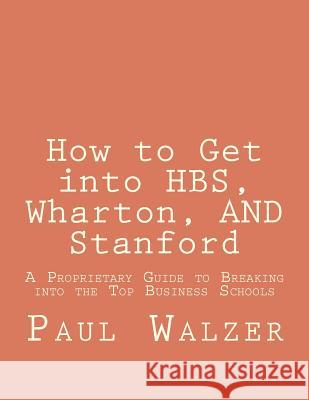How to Get into HBS, Wharton, AND Stanford: A Proprietary Guide to Breaking into the Top Business Schools » książka
How to Get into HBS, Wharton, AND Stanford: A Proprietary Guide to Breaking into the Top Business Schools
ISBN-13: 9781468051612 / Angielski / Miękka / 2011 / 64 str.
How to Get into HBS, Wharton, AND Stanford: A Proprietary Guide to Breaking into the Top Business Schools
ISBN-13: 9781468051612 / Angielski / Miękka / 2011 / 64 str.
(netto: 376,30 VAT: 5%)
Najniższa cena z 30 dni: 394,02
ok. 16-18 dni roboczych
Dostawa w 2026 r.
Darmowa dostawa!
One of the biggest mistakes that business school applicants make is that they don't really understand the purpose of the admissions process. To really understand this, you have to realize that as an applicant, your customer is the school. And to serve your customer well, and to exceed their expectations, you have to understand what they're looking for. In order to do that, you have to really understand the underlying business model of the top business schools. Once you understand this model, you'll see very clearly why the admissions process isn't arbitrary at all and that there's a formula you can use to crack the system. So why is HBS, HBS? Why is it so revered? Why are Stanford and Wharton so admired? What makes these brands as powerful as they are? It's certainly not the education, the facilities, the job placement rates, or the professors. It's their alumni. More specifically, it's their famous alumni. What would HBS be without Meg Whitman (HBS '79, former CEO of eBay), Mitt Romney (HSB '74, former Presidential candidate), Hank Paulson (HBS '70, former CEO of Goldman Sachs and current Treasury Secretary) and all of the other famous CEOs and politicians? What would Stanford be without Charles Schwab (GSB '61, Founder of Charles Schwab) and Phil Knight (GSB '62, Founder of Nike)? What would Wharton be without Peter Lynch (Wharton '68, former Vice Chairman of Fidelity) and Anil Ambani (Wharton '83, Chairman of Reliance ADA Enterprises)? Would Columbia be the same school without Warren Buffet (Columbia '51, CEO of Berkshire Hathaway)? A school's brand and prestige is driven by the success and fame of its alumni. Each year HBS enrolls 900 students, Wharton enrolls 800 students and Stanford enrolls 370 students. Every class year is like a separate portfolio of potential future leaders. HBS "invests" in 900 students with the hope that one of them will become the next A.G. Lafley (HBS '77, former CEO of P&G) or Ann Moore (HBS '78, CEO of Time). It is the extraordinary achievements of its alumni that give top schools like HBS its brand and prestige. With that said, in order to sustain its brand, HBS needs to produce Fortune 500 CEOs generation after generation. Therefore, the goal of business school admissions is to accept candidates with the highest potential to become strong leaders who will make the school proud someday. So why should this matter to you? Well, if you can truly appreciate and embrace this perspective, you'll be able to craft a great application. The one and only goal of your application should be to convince the admissions committee that you could potentially become the next Jack Welch. This guide will help you to do exactly that.
Zawartość książki może nie spełniać oczekiwań – reklamacje nie obejmują treści, która mogła nie być redakcyjnie ani merytorycznie opracowana.











